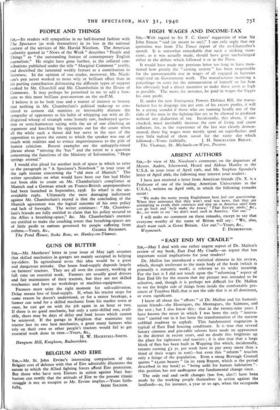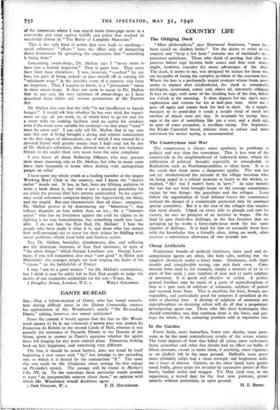EAST END MY CRADLE"
SIR,—May I deal with one rather urgent aspect of Dr. Mallon's review of my book, East End My Cradle—an aspect that has important social implications for your readers?
Dr. Mallon has introduced a statistical element in his review, which, though irrelevant to the main body of the book (which is primarily a romantic work), is relevant to its wider meaning. For the fact is I did not touch upon the " reforming " aspect of East End life for the reason that my picture was intended to be selective, and, though it is perhaps not difficult for Dr. Mallon to see the bright side of things from inside the comfortable pre- cincts of Toynbee Hall, that is not the side that is at all dominant, or even significant.
I knOw all about the " efforts " of Dr. Mallon and his humani- tarian friends—the Henriques, the Montagues, the Salmons, and the rest ; but I also know this : that in the twenty-nine years I have known the street in which I was born the only " innova- tion" carried out in it has been the transformation of the narrow cobbled roadway to asphalt. This fundamental stagnation is typical of East End housing conditions. It is true that several luxury cinemas and pin-table saloons have made an appearance in the district in recent years, and no doubt this brightens up the place for sightseers and tourists ; it is also true that a large block of flats has been built in Wapping (for which, incidentally, tenants earning £2 5s. per week have to pay away more than a third of their wages in rent)—but even this " reform " touches only a fringe of the population. Even a smug Borough Council quotes " 12,000 houses " (in its 1929 Report, which is the period described in my book) as " being unfit for human habitation ": this position has not undergone any fundamental change since.
The only real and swift changes (too few, alas!) have been made by the working people themselves in action against the landlords—as, for instance, a year or so ago, when the occupants
of the tenements where I was reared made front-page news in a rent-strike and siege against bailiffs and police that reached its successful climax in "The Battle of Langdale Mansions."
This is the only kind of action that ever leads to anything— social reformers' " efforts" have the effect only of dampering down resentment by spreading the impression that " something Is being done."
Concerning sweat-shops, Dr. Mallon says I " never seem to have met a factory inspector." That is quite true. They must have been busy elsewhere. I was, however, " coached " by my boss (on pain of being sacked) to pass myself off as earning the "minimum wage" in the possible event of a surprise visit from an inspector. This, I happen to know, is a " precaution " taken in most sweat-shops. It does not seem to occur to Dr. Mallon that in any case the very existence of sweat-shops as I have described them belies any serious pretensions of the Factory Act.
Dr. Mallon also says that the dole "is not insufficient to banish hunger." I would ask him whether he has ever tried the experi- ment on 15s. 3d. per week, 7s. of which have to go for rent for a room with no cooking facilities (and no outlay for crockery even if the room were suitable for cooking)—so that every "meal " must be eaten out? I can only tell Dr. Mallon that in my own case this sort of living brought a strong and athletic constitution to the first stages of tuberculosis, out of which I was nursed by a devoted friend with greater means than I had—and not by any of Dr. Mallon's reformers, who allowed two of my less fortunate friends to die under their very noses from the same complaint.
I also know all about Relieving Officers, who may present their more charming side to Dr. Mallon, but who in many cases leave their humanity at home when dealing with unimportant people on relief.
I have spent my whole youth as a leading member of the largest Working Boys' Club in the country, and I know the " charity racket " inside out. It has, in fact, been my lifelong ambition to write a book about it, but this is not a practical possibility for me while the present libel laws remain unamended. In my experi- ence social reformers comprise mainly the hypocritical, the blind, and the stupid. But one characteristic they all share : smugness. Dr. Mallon proves it by denouncing my " bitterness ": that reflects discredit on him rather than on me ; for a " humani- tarian " who has no bitterness against the evils he claims to be fighting is no true humanitarian, but something much less laud- able. I do not hate the East End, Dr. Mallon! I hate the people who have made it what it is, and those who (no matter how well-meaning) act as cover for their crimes by fiddling with social problems which need bold and fearless action.
Yes, Dr. Mallon, bestiality, drunkenness, dirt, and suffering are the dominant elements of East End existence, in spite of "the other things" which George Lansbury saw. George Lans- bury, if you will remember, also once " saw good " in Hider and Mussolini: the younger people are now reaping the fruits of his " visions " on the battlefields of France.
I may "not be a good witness " for Dr. Mallon's convenience, but I think it may be safely left to East End people to judge the merits of our respective credentials for the job.—Yours, &c.,
7 Doughty Street, London, W.C. I. WILLY GOLDMAN.































 Previous page
Previous page